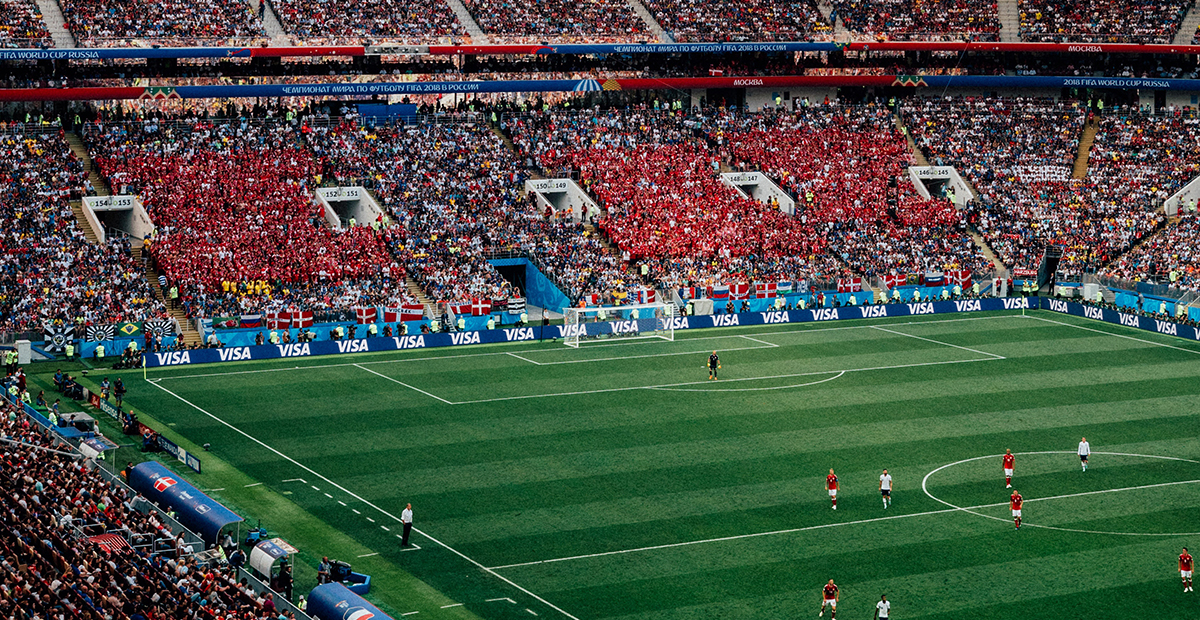Sport
Football’s Must Win Game
6 November, 2018 | Written by: Thomas Fleetham
Categorized: Sport
Share this post:
Football is changing. Season ticket holders are getting older and digital disruption threatens the status quo and the traditional way fans view the beautiful game. With full stadiums and the continued growth in TV revenue no longer guaranteed, it is time for football clubs to harness the power of technology to enhance fan experience, without losing sight of their core offering – the live match.
Football, though overwhelmingly popular, isn’t immune to what is happening in the wider world. Earning power is being concentrated in older social groups and younger fans want to engage in different ways. According to statistics recently released by the Premier League, the current average age of season ticket holders is 41. Young people are missing out on the match going ritual experienced by previous generations and the long-term impact of this shift is yet to be truly felt.
Meanwhile, the growth in popularity of esports has been so phenomenal that the 2017 League of Legends World Championship final was viewed by 60m people – that’s about half the global audience for the Super Bowl. This trend looks set to continue and current projections suggest that the esports industry could be worth £1 Billion by 2020. What remains unclear is whether it’s possible to convert esports fanatics into the season ticket holders of the future.
In addition to esports growth OTT providers are beginning to buy up the live TV rights. Whilst initially this is likely to push football’s revenues even higher, organisations as innovative as Amazon and Google will undoubtedly look to transform the existing model to facilitate distribution to their wider global audiences.
In order to contend with this disruption clubs need to work out how to juggle the challenge of achieving short-term growth, protecting the future of the game and not neglecting loyal local fans. The passion, lifelong dedication and sheer number of football fans provides clubs with significant and broad opportunities for revenue generation, stretching far beyond the confines of the stadium. But on the other hand, passion over an extended period leads to traditions that are considered sacred. The digital revolution has empowered the hardcore fans, who now have a platform to lead the dialogue on how ‘their’ club should be run.
IBM iX is committed to helping football clubs succeed in this must win game. Below are the top 7 steps that large clubs should take, to drive enhanced experiences for fans and in doing so protect the future of football…

1. Build a digital strategy that combines fan experience, partner value and technology (in that order)
In order to grow in the short term and protect their long term future, clubs need to develop a digital strategy that incorporates the needs of multiple fan groups, opportunities for existing and potential partners, as well as the transformational potential of enabling technology. This is a really complex problem for football clubs to solve because they are hugely diverse organisations, with silos that prevent the type of agile working required to make such a strategy a reality. The clubs that find a solution to this problem will be able to build future proof strategies and value propositions that stand the test of time.

2. Provide ‘Datatainment’
Although most fans don’t realise it they are nearly all data junkies. As such, a huge proportion of the time fans engage with football is spent obsessing over fantasy football stats, top scorers, clean sheets, goal difference, record transfer fees etc. Every club has access to unique data that could and should be used to bring engaging experiences and insights to fans, giving them bragging rights in the pub and/or providing insider knowledge that makes them feel closer to their club.

3. Design experiences for international fans without neglecting local ones
In order to increase the loyalty of international fans, clubs need to explore how technology can provide experiences that allow them to feel part of a community that they may never have the opportunity to be physically close to. Think AR and VR experiences, loyalty schemes that reward social engagement, bespoke international membership packages and social recognition from the club, or even better from star players. Clubs should also find ways to link international fans together digitally and physically. This will result in fans producing their own compelling content, which clubs can then look to collate and incorporate via their official channels, allowing all fans to feel valued.

4. Have real conversations with empowered fans
Football club’s inherent reluctance to avoid PR scandals is outdated. Social media users are used to controversial, viral tweets from high profile influencers and are comfortable with opinion and vigorous debate. Football is primarily entertainment, the next generation of fans enjoy the unpolished authenticity of such exchanges and would relish the opportunity to communicate directly with their favourite club and players. Ignoring the conversation does not make it disappear and over time social communities tend to self-police anyway. The clubs brave enough to adopt adventurous social strategies, may find that risking the wrath of the trolls results in the reward of an increasingly engaged, loyal and younger fan base.

5. Find ways to embrace esports that works for football
The growth of esports is potentially a significant threat to the future popularity of the Premier League. Clubs must take this threat seriously and look for ways to integrate football with esports, in a way that avoids cannibalising the next generation of season ticket holders.
Major esports tournaments attract audiences of similar sizes to that of Premier League football matches. There is therefore, an opportunity for clubs to partner with esports tournament organisers and utilise stadiums to hold the events. This would provide clubs with invaluable data and the opportunity to engage with a demographic made up of many potential customers, in an inspiring venue that they may never have otherwise visited.

6. Design integrated digital experiences around prioritised fans
Sports organisations often fall into the trap of under-valuing design and creating a website that attempts to satisfy the full range of diverse services that they offer. In doing so they end up trying to be all things to all people and this results in a bad experience and a website that nobody really enjoys using.
A website is yesterday’s news and in today’s fast moving digital world just thinking ‘website’ won’t even allow clubs to catch up with the current digital leaders in the entertainment industry. Instead football clubs need to be thinking about using Digital Experience Platforms (DXPs) and AI technology to integrate their capabilities and collect holistic fan data. This will enable them to prioritise the fans that they want to engage with and to deliver consistent end-to-end experiences, that are personalised to the specific needs of the fan.

7. Augment the match day experience without losing what makes it special
Once in the stadium some clubs are beginning to co-create with partners, to bring fans enhanced experiences that integrate the best parts of both brands. A great example is Man City’s partnership with Tinder which allows single fans to find a potential date with at least one very important thing in common!
What clubs mustn’t do however, is to meddle with what makes attending a live match a compelling experience. Premier League fans are not NFL, Rugby or Cricket fans. They generate their own unrivalled unique atmosphere and they don’t want to be distracted from the match, because looking at your phone for 10 seconds might well mean missing the only goal of the game.
The must win game
Football is the most popular sport in the World however, many fans feel they have been taken for granted for decades by the large clubs who have in turn contributed to the creation of a demographic timebomb that threatens the future of the game. These same clubs must now look to the power of data and technology to transform the way they engage with their local and international fans, to create a digital experience that rivals the thrill of attending a live match.

Sports Transformation Consultant
Preparing for the defence of the Realm
In light of current conflicts, the UK is now faced with real-world military decisions that will affect our immediate future. Ed Gillett and Col Chambers assert that industry and government must switch to a readiness mindset before the European post-war peace shatters. “My vision for the British Army is to field fifth-generation land […]
Frontier Fusion: Accelerating the Path to Net Zero with Next Generation Innovation
Delivering the world’s first fusion powerplants has long been referred to as a grand challenge – requiring international collaboration across a broad range of technical disciplines at the forefront of science and engineering. To recreate a star here on Earth requires a complex piece of engineering called a “tokamak” essentially, a “magnetic bottle”. Our […]
Safer Technology Change in the Financial Services Industry
Many thanks to Benita Kailey for their review feedback and contributions to this blog. Safe change is critical in keeping the trust of customers, protecting a bank’s brand, and maintaining compliance with regulatory requirements. The pace of change is never going to be this slow again. The pace of technology innovation, business […]





























